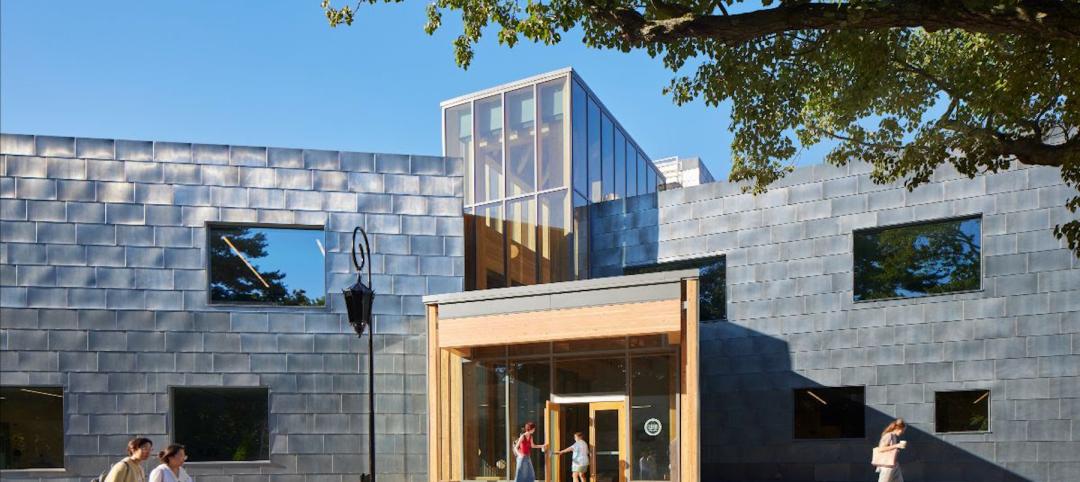The architecture programs at Parsons The New School for Design and Clemson University have been selected as 2014 NCARB Award recipients for developing innovative curricula that merge practice and education.
The National Council of Architectural Registration Boards (NCARB) announced the recipients at the Association of Collegiate Schools of Architecture (ACSA) Administrators Conference.
The NCARB Award supports initiatives at architectural schools that will have a long-term impact on students, faculty, and curriculum. It is designed to help schools implement new programs that bridge the gap between practice and education in a classroom, seminar, or studio setting.
“The award honors innovative ways for weaving practice and academy together to address real-world architecture challenges,” said NCARB CEO Michael J. Armstrong. “The winning proposals for 2014 explore new paradigms of practice and move students from the theoretical to applied practices working with licensed practitioners.”
2014 NCARB Award Recipients
Program: Clemson University, School of Architecture—Clemson, S.C.
Proposal: “Graduate Program in Architecture + Health”
Total Award: $30,000
The mission of the project is to advance health care facility design through collaboration among architects, academia and members of the healthcare industry. The primary outcome will be to expose a cohort of architecture and health (A+H) Master of Architecture students—through three integrated courses within the A+H Curriculum—to the challenges of designing health care settings that support the delivery of high quality, cost effective, culturally relevant health care for medically under-served populations.
“This project’s social capacity is far-reaching,” said Wendy Ornelas, FAIA, associate dean and professor at Kansas State University’s College of Architecture, Planning & Design, and the chair of the 2014 NCARB Award Jury. “It creates a road map for healthcare but is also a framework that is portable across all project types."
Program: Parsons The New School for Design, School of Constructed Environments—New York
Proposal: “Student-Practitioner Partnerships in Building Performance Evaluation”
Total Award: $20,232
While there is increased emphasis on sustainability, instruction on performance measurement is lacking. The proposal addresses a new and critical opportunity for architecture students to improve the environmental performance of buildings through measurement. The project involves purchasing new tools to enable students, during seven-week assignments, to work with practitioners to evaluate the real-world energy performance of buildings. Equipment purchased with the Award includes environmental meters for the measurement of temperature, humidity, air velocity, light level, sound pressure, carbon dioxide, carbon monoxide, and other performance factors.
“Many of the buildings are LEED or net-zero buildings, and this program will provide us with a cadre of information and data on whether or not these buildings are doing what they are supposed to be doing,” Ornelas said.
The 2014 NCARB Award Jury rigorously and impartially evaluated proposals against a published set of criteria. The jury comprised architects and emerging professionals who volunteered extensive time and expertise to fulfill their charge. Led by Wendy Ornelas, FAIA, Manhattan, KS, chair of the 2013 NCARB Award Jury, members included: Michael Archer, Assoc. AIA, Brooklyn, NY; Leticia Canon, AIA, MBA, NCARB, LEED AP BD+C, Dallas, TX; John Ehrig, FAIA, LEED AP, Orlando, FL; Linaea Floden, LEED AP BD+C, Tampa, FL; Emily Forquer, NCARB, Afton, IA; and Stephen Schreiber, FAIA, Amherst, MA. (Award Jury members with any connection or potential conflict of interest abstained from voting on that school’s proposal.)
Since 2001, the Council has supported the integration of practice and education by awarding more than $900,000 to schools through the NCARB Prize (2001-2011) and the NCARB Award (2006-present; known as the NCARB Grant until 2012). These funds have reached 60 schools—representing more than a third of all NAAB-accredited degree programs.
Related Stories
Building Team | Oct 27, 2022
Who are you? Four archetypes shaping workspaces
The new lifestyle of work requires new thinking about the locations where people work, what their workflow looks like, and how they are performing their best work.
Codes and Standards | Oct 27, 2022
Florida’s Surfside-inspired safety law puts pressure on condo associations
A Florida law intended to prevent tragedies like the Surfside condominium collapse will place a huge financial burden on condo associations and strain architecture and engineering resources in the state.
University Buildings | Oct 27, 2022
The Collaboratory Building will expand the University of Florida’s School of Design, Construction, and Planning
Design firm Brooks + Scarpa recently broke ground on a new addition to the University of Florida’s School of Design, Construction, and Planning (DCP).
Building Team | Oct 26, 2022
The U.S. hotel construction pipeline shows positive growth year-over-year at Q3 2022 close
According to the third quarter Construction Pipeline Trend Report for the United States from Lodging Econometrics (LE), the U.S. construction pipeline stands at 5,317 projects/629,489 rooms, up 10% by projects and 6% rooms Year-Over-Year (YOY).
Data Centers | Oct 25, 2022
Virginia county moves to restrict the growth of new server farms
Loudoun County, Va., home to the largest data center cluster in the world known as Data Center Alley, recently took steps to prohibit the growth of new server farms in certain parts of the county.
Museums | Oct 25, 2022
Seattle Aquarium’s new Ocean Pavilion emphasizes human connection to oceans
Seattle Aquarium’s new Ocean Pavilion, currently under construction, features several exhibits that examine the human connection with the Earth’s oceans.
Energy-Efficient Design | Oct 24, 2022
Roadmap shows how federal buildings can reach zero embodied carbon emissions by 2050
The Rocky Mountain Institute (RMI) has released a roadmap that it says charts a path for federal buildings projects to achieve zero embodied carbon emissions by 2050.
Higher Education | Oct 24, 2022
Wellesley College science complex modernizes facility while preserving architectural heritage
A recently completed expansion and renovation of Wellesley College’s science complex yielded a modernized structure for 21st century STEM education while preserving important historical features.
Transportation & Parking Facilities | Oct 20, 2022
How to comply with NYC Local Law 126 parking garage inspection rules
Effective January 1, 2022, New York City requires garage owners to retain a specially designated professional engineer to conduct an assessment and file a report at least once every six years. Hoffmann Architects + Engineers offers tips and best practices on how to comply with NYC Local Law 126 parking garage inspection rules.
Architects | Oct 20, 2022
Michael Graves Architecture acquires Jose Carballo Architectural Group
Michael Graves Architecture (MG), an award-winning global leader in planning, architecture, and interior design based in Princeton, NJ, announces the acquisition of Jose Carballo Architectural Group (JCAG), a New Jersey-based architecture firm.

















